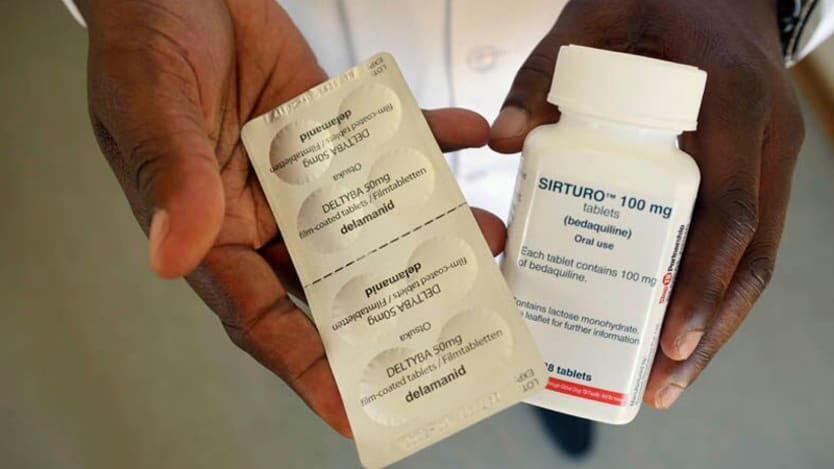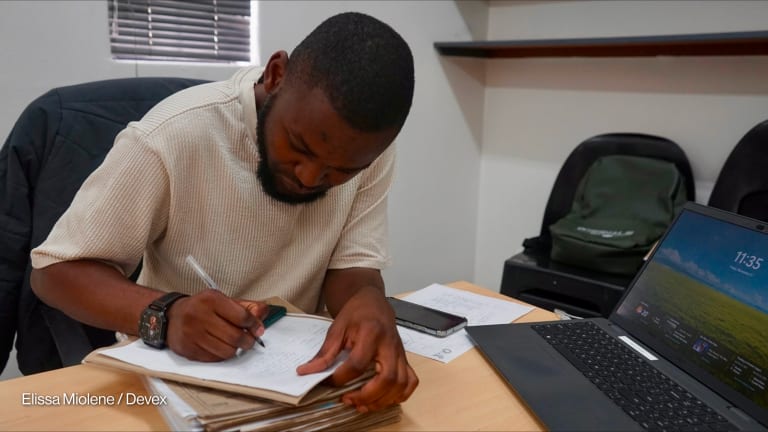
AMSTERDAM — The World Health Organization could soon start promoting a new tuberculosis drug that is now more affordable after South Africa brokered a deal with a pharmaceutical company to slash the price by half.
WHO had previously issued guidance limiting the use of the breakthrough drug bedaquiline, but told Devex it is looking to revise this in the wake of new evidence about its effectiveness in treating people with drug-resistant TB.
The news comes as countries prepare to meet in New York for the first United Nations high-level meeting on TB in September, which advocates hope will translate into increased political commitment to eradicating the infectious disease. It killed nearly 1.6 million people in 2016, making it the ninth leading cause of death worldwide and more deadly than HIV/AIDS.
Ahead of the high-level meeting on TB:
► More political attention, research solutions needed for TB, experts say
► What are the strategies to make 2018 the year for TB action?
The increase in new cases of multidrug-resistant and extensively drug-resistant TB, known as MDR-TB and XDR-TB respectively, is a major concern. There were 600,000 new cases in 2016, more than 60 percent of which were in India, China, South Africa, and Russia. Currently, only about half of all MDR-TB patients are cured. If left untreated, those with the infection can pass it to 15 people every year, according to WHO.
South Africa, which had an estimated 19,000 cases of drug-resistant TB in 2016, is leading a push to get more countries to purchase bedaquiline, the first TB drug with a novel mechanism in decades. In June, the country announced it would be the first to roll out the drug to all drug-resistant TB patients, having struck a deal with manufacturer Johnson & Johnson to secure a nearly 50 percent discount. South Africa pays $400 for a six-month course of treatment, where it previously paid $750.
The drug company has promised to sell eligible countries bedaquiline at the same price through the Global Drug Facility, which is run by the Stop TB Partnership, and helps low- and middle-income countries access anti-TB drugs.
Speaking to Devex on the sidelines of last month’s AIDS 2018 conference in Amsterdam, South Africa’s health minister Aaron Motsoaledi said he hopes the offer is taken up, especially by BRICS countries — India, China, Russia, Brazil, and South Africa.
“If you win in the BRICS you have already won half of the battle [against MDR-TB],” he said.
However, convincing WHO to change its guidelines around the drug will also be crucial.
First introduced in 2012, bedaquiline was the first new TB drug to get United States Food and Drug Administration approval in more than 40 years. At the time, WHO issued interim guidelines recommending the drug be given for a maximum of six months, only to patients who have MDR-TB, and only as a last resort. This was based on early trials, which WHO specialists were concerned showed low cure rates and some safety worries.
The agency revisited the guidance in 2015 but did not change it. The drug is still in clinical trials but has already been used to treat 65,000 patients across more than 100 countries.
However, WHO now looks set to update its guidelines in light of new evidence from South Africa, which showed MDR-TB patients who took bedaquiline were more likely to survive compared to those on standard treatment. Civil society groups have also been calling for WHO “to recommend bedaquiline as part of the preferred regimen for MDR-TB,” according to a letter sent by the Global TB Community Advisory Board and signed by more than 30 NGOs and other experts.
A spokesperson for the U.N. health agency confirmed a change could be imminent, telling Devex that “WHO is revising its treatment guidelines for multidrug-resistant TB. This includes the use of medicines like bedaquiline … [and] the likely outcome is that the composition of treatment regimens will change based on the latest information on the effectiveness and safety of the different TB medicines.”
Benefits of bedaquiline
Motsoaledi said Johnson & Johnson’s decision to slash the price of the TB drug would have major benefits for patients since bedaquiline is less painful to take, quicker, and more effective than the traditional course of treatment — injectable drugs — which cause side effects including hearing loss in up to half of patients.
“It’s a huge advance taking into consideration that the alternative … was injectables where you had to get an injection every day for 18 months. You can imagine the trauma, but it doesn’t end there. The chances are high that you are going to lose your hearing because all of the injectables are ototoxic,” the minister said.
However, the $400 price tag will still be too high for some countries, according to Paul Stoffels, Johnson & Johnson’s chief scientific officer. As a result, the company will continue to offer a bedaquiline “safety valve,” in the form of free treatment courses, to vulnerable populations such as refugees.
Furthermore, until March 2019, low-income countries will still be able to access the drug for free through a donation program run by the U.S. Agency for International Development, under which the pharmaceutical company initially offered 30,000 six-month courses of bedaquiline, and later added another 30,000 doses.
Lucica Ditiu, executive director of the Stop TB Partnership, welcomed South Africa’s decision to roll out bedaquiline and called on others to follow the example. But she cautioned that the drug is not a “silver bullet” for ending resistant TB and that research into alternatives — especially a vaccine — needs to continue.
In South Africa, ATM pharmacies help fill a massive shortfall
South Africa needs about 12,000 pharmacists to fulfill the international standard of 50 pharmacists per 100,000 people. To combat long waiting times for patients, the country is now trialing a new type of pharmacy.
“We only have two drugs and we need a pipeline of 18 … [so] we’re not very far along,” she said. This is in part because there is a relatively small market for MDR-TB treatment, she added.
Stoffels said his company is committed to continuing its TB research. “We’re not done yet, we need more … We are continuing the research to try and further optimize the regimen, [to] make it shorter, more effective, [and] more safe,” Stoffels said.
High hopes for U.N. meeting
The U.N.’s high-level meeting on TB is set for Sept. 26, during which advocates will be pushing for strong new treatment targets; increased funding; new and better treatment options, including a vaccine; and stronger accountability frameworks, Ditiu said during a press briefing at the AIDS 2018 conference.
Motsoaledi, who is also chair of the Stop TB Partnership board, described TB as an “orphan” compared to other global diseases, which have received more political attention and funding in the past, but said he hopes this will change during the “breakthrough” U.N. event.
“I think the world thought we had defeated TB … but over [the] last 200 years TB has killed more people than influenza, malaria, cholera … all added together,” the minister said.
He is especially keen for fellow BRICS countries to commit themselves to tackling drug-resistant TB and to “make resources available for new drugs and diagnostics,” he said, since half of the MDR-TB burden is within their borders. He was optimistic they would move in the right direction.
“I’m quite sure they are going to move [and] we are going to show them this is a global health risk … we are all vulnerable [to TB],” he said, pointing out that even South Africa’s former President Nelson Mandela suffered from the infection.
Devex, with financial support from our partner MSD for Mothers, is exploring how the private sector is driving innovations in global health. Visit the Focus on: Future of Health Partnerships page for more.








